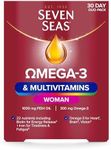Buying Guide for the Best Multivitamins For Women
Choosing the right multivitamin for women involves understanding your specific health needs and lifestyle. Multivitamins can help fill nutritional gaps in your diet, but it's important to select one that complements your age, dietary restrictions, and health goals. Always consider consulting with a healthcare provider to tailor your choice to your personal health profile.Nutrient CompositionNutrient composition refers to the specific vitamins and minerals included in the multivitamin. This is important because different nutrients support different bodily functions, such as bone health, energy production, and immune function. When navigating nutrient composition, look for a multivitamin that includes essential nutrients like Vitamin D, Calcium, Iron, and B Vitamins, which are particularly important for women. Choose a composition that addresses your specific health needs, such as higher iron for those with heavy menstrual cycles or more calcium and Vitamin D for bone health.
Age-Specific FormulasAge-specific formulas are multivitamins tailored to the nutritional needs of different age groups. This is important because nutritional requirements can change as you age. For example, younger women may need more iron, while older women might require more calcium and Vitamin D. When choosing a multivitamin, consider your age group: women in their 20s and 30s might focus on reproductive health, while those over 50 should look for formulas that support bone health and cardiovascular function.
Form of the MultivitaminThe form of the multivitamin refers to how the supplement is delivered, such as tablets, capsules, gummies, or powders. This is important because it can affect how easily you can incorporate the multivitamin into your daily routine. Tablets and capsules are common and often have a higher concentration of nutrients, while gummies and powders can be easier to consume for those who have difficulty swallowing pills. Choose a form that you are comfortable taking consistently, as regular intake is key to effectiveness.
BioavailabilityBioavailability is the degree to which nutrients are absorbed and utilized by the body. This is important because even if a multivitamin contains a high amount of nutrients, they are only beneficial if your body can absorb them. Look for multivitamins that include chelated minerals or are labeled as having high bioavailability. If you have digestive issues or specific absorption concerns, consider a multivitamin with enhanced bioavailability to ensure you are getting the most benefit.
Allergen InformationAllergen information indicates whether the multivitamin contains common allergens such as gluten, dairy, soy, or nuts. This is important for individuals with allergies or dietary restrictions. When choosing a multivitamin, carefully read the label to ensure it does not contain any ingredients you are allergic to or wish to avoid. Opt for hypoallergenic or allergen-free options if you have known sensitivities.
Additional IngredientsAdditional ingredients refer to any extra components in the multivitamin, such as herbal extracts, probiotics, or omega-3 fatty acids. These can provide added health benefits but are not essential for everyone. Consider your health goals when evaluating additional ingredients. For instance, if you are looking to support digestive health, a multivitamin with probiotics might be beneficial. Choose additional ingredients that align with your specific health needs and lifestyle.

















